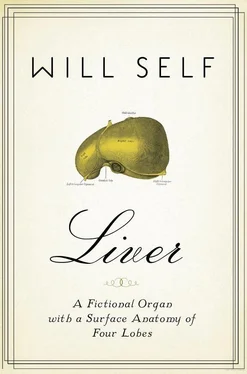‘OK,’ the old-hippieish woman cried, ‘ jetzt — aufstehen .’ The girl straightened up, and with her clawed hands vigorously backcombed her laquered hair until it rose up in a great ruff. ‘ Und. n ä chster !’ the woman cried, and the girl scampered away to be replaced by a second, who adopted the same posture and was duly sprayed.
‘Well, so, you have converted, yes?’ said a voice right behind Joyce. She jerked round. Quantus tremor est futurus, Quando judex est venturus, Cuncta stricte discussurus. Breath on my neck, moustache prickle; night presses against a cold black pane, vast, impersonal, yet alive.
‘Uh — y-yes; sorry — I mean, no.’
The otter-headed man laughed. ‘ I’m sorry,’ he corrected her. ‘I gave you a jump. Marianne always says to me’ — his nut-brown eyes slid away from hers, to where the tight-faced woman was examining a noticeboard — ‘that I am too on your face.’
‘I think,’ Joyce said, ‘the expression is ‘‘in your face’’.’
The moustache pouted. ‘Exactly so, in your face.’
He was in a loden coat today, olive with horn toggles. He really ought to have a Tyrolean hat as well — its absence made his hydroplaned head seem that much sleeker.
‘You must allow me to introduce myself,’ he said. ‘I am Ulrich — Ueli for shortness — Weiss, and this is my — how do you say it? — partner, Marianne Kreutzer.’
Hearing her name, the tight-faced woman came across and all three shook hands formally. Joyce put her in her mid fifties — older than Weiss — and with her gaunt, angular figure, she hardly seemed mistress material .
Joyce found herself co-opted by Weiss and the Kreutzer woman. They introduced her to some people: ‘Frau Beddoes, she is visiting from England.’ And showed her round the church. ‘An undistinguished building,’ Weiss said, ‘you will agree.’
Joyce did. Anglican churches were bad enough , with their tepid air of state-assisted piety, but Catholic ones had always seemed far worse : musty battlefields, where lust and repression fought it out, in the process torturing wooden effigies, then nailing them to the walls.
The trio stopped in front of a headless figure that stood in a spot-lit embrasure. It wore a blood-spattered toga, and its head rested at its sandalled feet like a gory football. Joyce stared at the severed head; it stared back, the Aztec eyes maniacal.
‘You would say,’ Weiss lectured, ‘St Antoninus, but here St Anton for shortness. He was the public executioner at the time of Emperor Commodus, second century, and responsible for the execution of St Eusebius, among many other martyrs. ’
Joyce registered that Weiss was trying to make all this interesting to her, but she was bored already. Sacred objects, she had always felt, needed to be so much more powerful and affecting than even the greatest artworks; if, that is, they were to perform the tasks assigned to them. Otherwise, what were they? Useless tat ; and what did that make God? Only a fervent bargain-hunter in a long white dress.
Marianne — the Kreutzer woman — had strolled to the next embrasure along. Here she lit a candle and stuck it on a blackened spike spattered with waxy rime. Joyce searched the tight face — its grey eyes closed, its long top lip vertically creased — for evidence of prayer, or yearning, but saw neither.
Weiss droned on: ‘. then this fellow, this executioner, he is having a dream, you know, a vision thing, Christ comes in his face, yes? And he repents.’ He brought his hand up abruptly, then dropped it. ‘Then it is his turn for the chopping, a martyr also now.’ Except that this sounded like ‘Allzo nao’. Weiss smiled, and upper canines slid from beneath his walrus moustache.
‘We Catholics have so many of the saints.’ He took Joyce by the arm and led her on. ‘Sometimes I think too many. No longer is there the selling of indulgences and all those corrupt practices; but the saints, I think this non-believers find hard to. accept: that a man, the Pope, can decide that the naturgem ä ss — the natural law — has been — how do you say it — suspended.’
Clearly, Weiss expected a response. Joyce said, ‘I had no idea there were so many Catholics in Switzerland; in England we think of the Swiss as very Protestant — ’
‘No music, yes? No dancing. All in the black, yes?’ He laughed. ‘In exact fact there are more Catholics here in Zürich than the Zwinglians. Many Old Catholics allzo; y’know, who, ah, say mass in the Latin.’
They reached the end of the nave and went into the vestibule. Father Grappelli was seeing off the last of his communicants: an elderly couple, both with ski sticks, both swaddled in full-length quilted coats, who were haltingly making their way down the shallow stairs.
Seeing them, Joyce remembered that she was ill — dying, in point of fact . Felt, too, Derry’s absence — as acutely as any human presence. Church bells were pealing across the valley of the Limmat, glockenspiel notes struck on bronze. Pigeons wheeled, Joyce’s head spun. She staggered a little, and Weiss tightened his grip.
Marianne Kreutzer came up beside them, her face betraying little concern. ‘But you are not well, so?’ she said. ‘I think this other time.’
‘I’m all right, really.’ Joyce detached herself from Weiss — his cologne was lemony, alcoholic, Father’s bay rum .
‘Perhaps you are hungry? It is lunch-time, we would’ — he sought confirmation from his partner — ‘be delighted if you would like to join us.’
‘Off course,’ Marianne said.
‘Oh, I don’t know.’ Joyce gathered her carpet bag into her arms. ‘I wouldn’t want to impose.’
‘It is not imposing.’ Again, the wolfish smile. ‘You are a guest in our country. Normal times we go to a bistro near to here — but of course you have visited the Kronenhalle?’
Joyce looked blank.
‘No? But really this is too bad, this is the most famous eating place in Zü rich; to be here and not to visit, it is almost a crime — you will please to be our guest.’
Father Grappelli was lingering, rolling and unrolling his scarf of lamb. He had a tentative expression on his boyish face, and Joyce guessed he was hoping the invitation would be extended to him. It wasn’t. Weiss, coughing Schweizerdeutsch, took the priest’s hand and shook it. Then he explained to Joyce, ‘I will get the car’, before skipping off down the steps while pulling on his suede gloves.
Joyce turned to Marianne: ‘Please, it isn’t necessary for all this. ’
Her tight face clenched still more. ‘Frau Beddoes,’ she said, ‘Ueli is not so ordinary Swiss person. He is ausl ä nderfreundlich — you say, friendly to the aliens. That is his. thing, so, come, please.’
Not deigning to take his hand, Marianne Kreutzer nodded to the rejected priest, then indicated to Joyce the car that was already idling by the kerb, as compact as a travel iron. As he leant across to open the passenger door, Weiss’s otter head dived out of it.
In the oaken burrow of the Kronenhalle, the Zürichers — sleek, black and dapper as moles — tunnelled their way through mounds of food. Many of them blinked from behind tinted Christian Lacroix glasses, as if even this subterranean ambience were too bright. The Zürich guilds’ coats of arms were painted on to the creamy plaster of the walls, up above the wood panelling. Waitresses bustled among the crisply laid tables, while the hunched maître d’ slowly propelled a trolley up and down the aisles, the silvery lid of which was rolled up, exposing a glistening joint of beef: the meaty pupil of a steely eye.
Читать дальше












